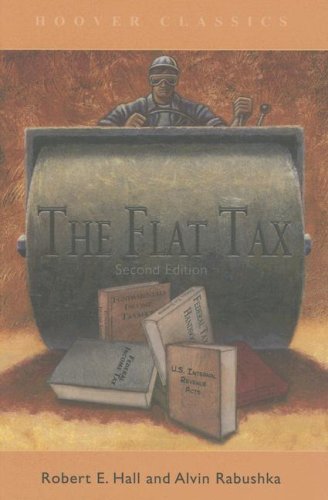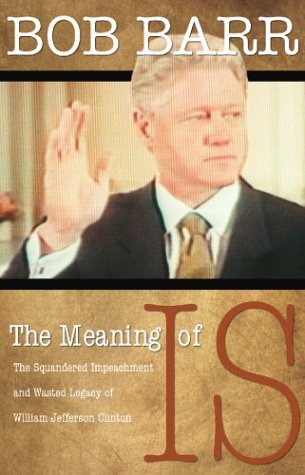In classical republican theory, government was to be a mixture of forms: the one, the few, and the many, each balancing the two others. In our Constitution, this mixture may be found, for example, in the offices of the President, the Senate, and the House of Representatives. We, the people, fill each office in democratic elections, but the natures of these offices differ, being leadership-oriented, principle-oriented, and poll-oriented, respectively. Ideally the House of Representatives ought to reflect closely the wishes of the people between elections. Thomas Jefferson spoke of two requirements for just lawmaking: majority will and respect for the equal natural rights of the minority. I believe that Representatives should, as delegates, reflect the will of their constituents and that Senators should, as trustees, focus on whether or not a bill respects the natural rights of all. As a little-d democrat little-r republican, I believe ... that the American people ought to be able to stand in the way of any legislation whatsoever, especially through what should be the most democratic branch of our republic, the House of Representatives. I also believe that small-l libertarians ... ought to be elected to the Senate so as to prevent oppressive legislation, standing up for those great general interests—the Declaration and the Constitution.This is an example of the noise we in the Libertarian Party of Minnesota made in 1994 in the debate over health care. In my last post, I mentioned how noisy we had been. I wanted to give an example.Casey Bowman (1994)
Here's a reprint of the full article -
Life, Liberty, and the Pursuit of Healthby Casey Bowman
[W]e both ... love [the people] with parental affection. But you love them as infants whom you are afraid to trust without nurses; and I as adults whom I freely leave to self-government.Thomas Jefferson (1816)On July 6, members of the Libertarian Party of Minnesota attended a town hall meeting on health care legislation, hosted by Wes Minter and broadcast live on WCCO radio (830 AM). Responding to questions from the audience and callers were four panelists: Congressman Rod Grams, Senator Paul Wellstone, Dr. John Goodman (co-author of Patient Power), and Ms. Lois Quam (Clinton task force member).
Minter began the show by citing a quote in that morning's Wall St. Journal, made by Senator Jay Rockefeller on April 18: "We're going to push through health care reform regardless of the views of the American people." Indeed, some big-D Democrats have now become little-a anti-democrats. In a defense of his statement in a letter to the Wall St. Journal, July 21, Rockefeller went on: "My point has been that the half-truths and hysteria turned out by special-interest groups may have confused the public on some of the details of reform...." So Rockefeller was not blaming the people, only special interest groups. "... [R]eprehensible are those who sow such confusion and uncertainty," he wrote.
A full response I dared not broach live on the Wes Minter Show, but I shall now. In classical republican theory, government was to be a mixture of forms: the one, the few, and the many, each balancing the two others. In our Constitution, this mixture may be found, for example, in the offices of the President, the Senate, and the House of Representatives. We, the people, fill each office in democratic elections, but the natures of these offices differ, being leadership-oriented, principle-oriented, and poll-oriented, respectively. Ideally the House of Representatives ought to reflect closely the wishes of the people between elections. Thomas Jefferson spoke of two requirements for just lawmaking: majority will and respect for the equal natural rights of the minority. I believe that Representatives should, as delegates, reflect the will of their constituents and that Senators should, as trustees, focus on whether or not a bill respects the natural rights of all. As a little-d democrat little-r republican, I believe, in contrast to Rockefeller, that the American people ought to be able to stand in the way of any legislation whatsoever, especially through what should be the most democratic branch of our republic, the House of Representatives. I also believe that small-l libertarians (hopefully some big-L ones, too) ought to be elected to the Senate so as to prevent oppressive legislation, standing up for those great general interests—the Declaration and the Constitution.
Other Libertarian Party members were vocal. Charles Test read aloud a quote from the Minnesota State Department of Health, which had been cited in the Minneapolis Star Tribune that morning: "The emphasis in medical savings accounts on individual autonomy and personal economic gain ... is largely incompatible with the policy goals of universal health coverage and managed care." Reflecting on this, Test asked, "Aren't individual autonomy and personal economic gain basic principles that America was built upon?"
Later Test quoted the Ninth Amendment to the United States Constitution: "The enumeration in the Constitution, of certain rights, shall not be construed to deny or disparage others retained by the people." This amendment affirms that the Constitution must respect the natural rights touched on by the Declaration of Independence that we, as individuals, retain.
Wes Minter followed up on Test's note of the Ninth Amendment by asking him how the founders might view the current policy debate. Test said they are all probably rolling in their graves. Minter asked which founders we Libertarians revere, Franklin, Jefferson? Test continued with a full list of founders, on up to Dolly Madison.
LPM member Evan Williams asked Dr. Goodman if it were true that 5% of Canadians are waiting for some medical procedure. Dr. Goodman responded by saying that 177,000 persons there are waiting for important surgery. Adding those waiting for non-life-saving surgeries, the total becomes one million, which all agreed was indeed about 5%.
Sen. Wellstone, at one point, claimed that a single-payer system would give people more choice rather than less choice. In reaction to one such remark, there was tumult in the audience. I remember, as one of the restless natives, crying out something about how part of the health care system closed down in Canada for a period. Wes Minter clearly enjoyed the enthusiasm exhibited by his audience. Wellstone also demanded that insurance companies never be allowed to deny anyone coverage, a remark in sync with Hillary Rodham Clinton's latest surreal lament on a morning show comparing insurance companies to car dealers who charge different prices for different cars and so restrict our choices.
In a parting shot at Rockefeller's remarks on special interests, I shall quote from an article written by the secretary and treasurer of the Arizona chapter of the Association of American Physicians and Surgeons, Mr. Richard Fisher ("Behind the Task-Force Veil", Liberty, July 1994):In February 1993, the Association of American Physicians and Surgeons filed suit under the Federal Advisory Committee Act ... to force the Clinton administration to reveal the task force's composition. In November, the admin[i]stration was ordered to comply. The documents thus made public suggest a very different picture of the task force than the White House has presented....
Among the special interests represented were United Health Care Corporation, Chicago Health Maintenance Organization, Aetna, Travelers, Liberty Mutual Insurance, Wausau Insurance Company, National Capital Preferred Providers Organization, Harvard Community Health Plan, Kaiser Permanente, U.S. Health Care, EDS Health Care, PCS Health Systems, First Health, Blue Cross/Blue Shield, and Alliant Health Systems....
One corporation represented on the task force was MCI Communications—the likely primary vendor for the 250 million cards Clinton's plan would require. Potential contractors for other parts of the Clinton plan were also amply represented, including the Rand Corporation, Alpha Center, Telesis, Cooper & Lybrand, Price Waterhouse, and the Principal Financial Group....
It is plain that ... Lois Qualm, vice president of United Health Care Organization, [and others] have conflicts of interest in helping formulate federal health-care policy. Yet these officials and executives of major managed-care concerns played significant task-force roles without obtaining waivers for conflicts of interest, despite the requirements of the law. ...
Rather than admit to the prominent participation of special interests in the formulating its health-care proposals, the White House chose the path of secrecy and closed doors. In doing so, it trampled on the law.
This article was originally published in The Minnesota Libertarian (State Fair edition) August 1994. The author and the original publication are due attribution.







